 Petzlover
Petzlover Brug is originated from United States but Gull Dong is originated from Pakistan. Brug may grow 60 cm / 23 inches shorter than Gull Dong. Brug may weigh 52 kg / 114 pounds lesser than Gull Dong. Brug may live 3 years more than Gull Dong. Both Brug and Gull Dong has almost same litter size. Brug requires High Maintenance. But Gull Dong requires Low Maintenance
Brug is originated from United States but Gull Dong is originated from Pakistan. Brug may grow 60 cm / 23 inches shorter than Gull Dong. Brug may weigh 52 kg / 114 pounds lesser than Gull Dong. Brug may live 3 years more than Gull Dong. Both Brug and Gull Dong has almost same litter size. Brug requires High Maintenance. But Gull Dong requires Low Maintenance
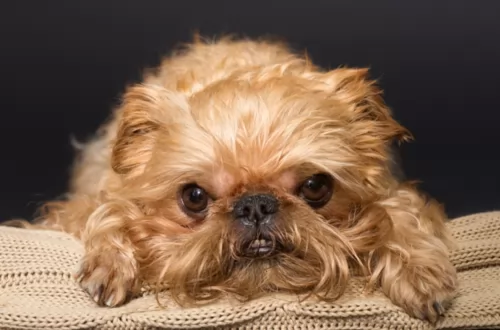 The Brug or Griffon Pug is not a purebred dog at this point in time. It is a cross between a Pug and a Brussels Griffon, currently known as a “designer dog” or a hybrid. This hybrid is really rare at this time but growing in popularity and breeders. Its exact history or original development is unknown at this time and needs to be researched as the hybrid develops into a breed, or breed clubs are formed. If you like either of the two breeds involved, you are sure to like the Brug. They are obviously not recognized by the major kennel clubs, but they are registered with a variety of hybrid/designer dog clubs. These include:
The Brug or Griffon Pug is not a purebred dog at this point in time. It is a cross between a Pug and a Brussels Griffon, currently known as a “designer dog” or a hybrid. This hybrid is really rare at this time but growing in popularity and breeders. Its exact history or original development is unknown at this time and needs to be researched as the hybrid develops into a breed, or breed clubs are formed. If you like either of the two breeds involved, you are sure to like the Brug. They are obviously not recognized by the major kennel clubs, but they are registered with a variety of hybrid/designer dog clubs. These include:
 The Gull Dong dog is thought to come from British Colonial India during the 1900's. The area later became known as Pakistan, and this is where the dog originated from.
The Gull Dong dog is thought to come from British Colonial India during the 1900's. The area later became known as Pakistan, and this is where the dog originated from.
Known also as the Bully Gull Terr, the dog came about by crossing Bully Kutta (Pakistani Mastiff) with a pure bred Gull Terr. The breeders wanted a dog that had the best features and characteristics of both the 2 dog breeds.
They were looking for particular characteristics such as size, strength and speed. This is a rare dog breed and he isn’t associated with any kennels or clubs, so not many records have been kept regarding their origin and development.
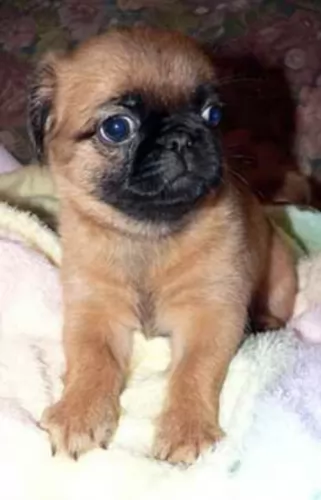 Like its two parental breeds, the Brug is a smaller sized dog – both parents are lab dogs and so is the Brug. Because they are hybrids, Brugs can be very different in appearance but most seem to have large eyes, squishy faces, black masks, fluffy hair, long black whiskers, short fluffy hair, flat ears and a fluffy tail. They could be in any of a number of colors including fawn, black, cream or apricot.
Like its two parental breeds, the Brug is a smaller sized dog – both parents are lab dogs and so is the Brug. Because they are hybrids, Brugs can be very different in appearance but most seem to have large eyes, squishy faces, black masks, fluffy hair, long black whiskers, short fluffy hair, flat ears and a fluffy tail. They could be in any of a number of colors including fawn, black, cream or apricot.
 The deep chested Gull Dong is a large dog and stands at 76 – 106cm in height and weighs in the region of 40 – 63kg.
The deep chested Gull Dong is a large dog and stands at 76 – 106cm in height and weighs in the region of 40 – 63kg.
He has a short, smooth coat in various colors such as white, grey, black, brindle or bi-color such as white with black spots. He is a muscular, powerful breed dog and his ears are mostly cropped, but when left they are short and floppy. His tail can be docked but these days it tends to be left long. He has a huge head, and similar to bulldogs, this mastiff dog has loose skin around the jaw and neck.
This is a strong-willed dog who is also intelligent. Just his sheer size will require that you have him trained and socialized. It is actually important to train and discipline this dog as he is strong willed. He is intelligent and learns easily.
After training, he will require a strong, firm and consistent owner. He is fairly suspicious of strangers and won't take kindly to anyone who tries to come onto his properly. He is a dominant, aggressive dog and while he is a loyal, loving pet with his human family, he isn't an ideal dog to have with small children in the home.
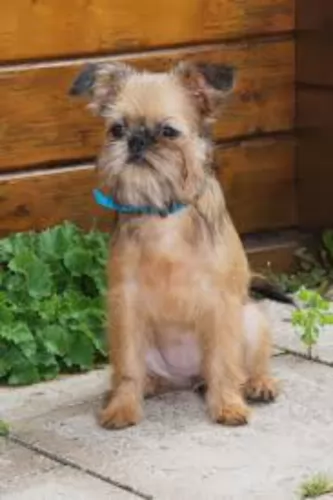 This hybrid is a loyal little dog. They are an affectionate lap dog that wants to be with his humans all the time. They have a very pleasant disposition and do well with children and other dogs. They might be shy to begin with but will warm up to affection. However, they are willful and self-important at times. This is tempered by their great sense of humor and empathy to its peoples’ moods. Left alone too long, they will tend to bark excessively.
This hybrid is a loyal little dog. They are an affectionate lap dog that wants to be with his humans all the time. They have a very pleasant disposition and do well with children and other dogs. They might be shy to begin with but will warm up to affection. However, they are willful and self-important at times. This is tempered by their great sense of humor and empathy to its peoples’ moods. Left alone too long, they will tend to bark excessively.
 This is a powerful, intelligent dog and with training and socialization he is capable of becoming a loving, protective pet who listens to you.
This is a powerful, intelligent dog and with training and socialization he is capable of becoming a loving, protective pet who listens to you.
He does tend to be aggressive and therefore people who are buying a dog for the first time might battle with the characteristics of this dog. He will certainly need a firm, strong, patient owner. He isn't the wisest choice for when you've got small children in the house, though well trained dogs and children are able to get along well together.
When your heavy, muscular Gull Dong is handled in a firm, kind manner, he is well exercised and fed and treated firmly and kindly, he is able to make a great, loyal companion.
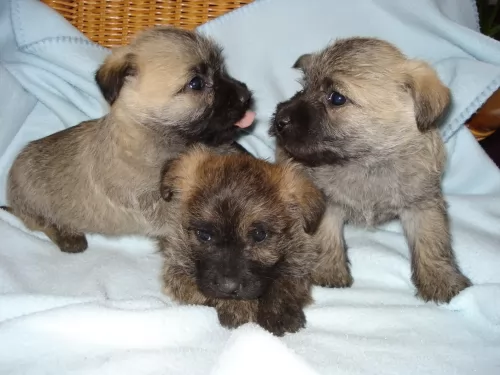 Usually the hybrid dog can have better health than either of the parents. This is true with the Brug as well, but there are also some issues they may inherit from the parents or face simply because of their size and complexion. These include:
Usually the hybrid dog can have better health than either of the parents. This is true with the Brug as well, but there are also some issues they may inherit from the parents or face simply because of their size and complexion. These include:
 The Gull is a fairly healthy dog, and with good care he can reach 10, 11 or 12 years of age.
The Gull is a fairly healthy dog, and with good care he can reach 10, 11 or 12 years of age.
If you choose to own a white one, you will know that he is susceptible to deafness and skin problems. White coated dogs battle with deafness, and the reason for this is that they carry the piebald gene. The piebald gene is a result of the absence of melanocytes – those cells which create pigment.
The ability to hear comes from a layer of cells within the inner ear which come from the same stem cell source. Without this stem cell, the dog isn't able to make this specialized layer of hearing cells.
With hip dysplasia, the head of the thigh bone doesn’t fit properly into the hip socket, resulting in the bone wearing away and arthritis settling in. Your dog can experience pain and stiffness and he can become lame. You'll notice he is no longer enthusiastic to join in with games and exercise.
Hip dysplasia can be managed with medication while some dog owners, if they can afford it, turn to surgery which can be very costly.
He is a deep chested dog and this means you need to be aware of the risks associated with bloat, an emergency gastrointestinal syndrome which can be life threatening and where your dogs stomach becomes hard and bloated.
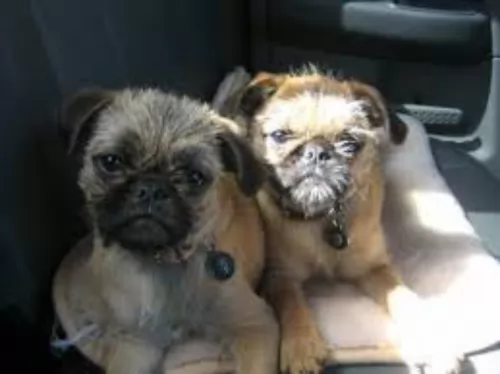 Don’t let this dog get overweight. Feed a high quality dry food intended for small or toy dogs. One fourth to one half of a cup per day in two separate meals is what is recommended.
Don’t let this dog get overweight. Feed a high quality dry food intended for small or toy dogs. One fourth to one half of a cup per day in two separate meals is what is recommended.
Patella Luxation or slipped knee caps – small dogs often have this issue. The patella is the knee cap and layman often called it a slipped knee cap, but it is also called slipped stifles. The femur, the tibia and the patella do not line up and this causes an abnormal gait or even lameness. Puppies are born with this, but it does not exhibit symptoms until years later. Arthritis is the most common result. Occasionally surgery is required.
Eye Issues – Cherry eye, a genetic disease, as well as irritation from air borne particles, allergies or scratches.
Skin Allergies – They can have skin allergies so watch for excessive licking or scratching.
Breathing Issues – Asthma and respiratory issues are common among small dogs with these types of faces.
Like their 2 breed parents, the Brug is a small but energetic hybrid. They need to play and run on a daily basis. Leash walks are good, but they need a yard or dog park as well. They are athletic little dogs and are good at tracking, obedience and agility. You cannot force them to do an activity but if its fun they will jump right in.
 Plenty of room to run around in is important for the Gull Dong as he is a working breed who is used to having a job to do. You will certainly need to take him on walks or play rope- and ball games with him.
Plenty of room to run around in is important for the Gull Dong as he is a working breed who is used to having a job to do. You will certainly need to take him on walks or play rope- and ball games with him.
The Gull will require brushing twice a week as he is a short haired dog and an average shedder.
This is a large energetic dog and you will need to feed him a high quality food specially for large, energetic dogs. He needs his full quota of minerals and vitamins in his food. Provide him with homemade food such as cooked chicken, rice and vegetables and some raw meat from time to time. Never leave him without a constant supply of fresh, cool drinking water.